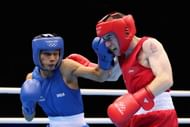The hype that surrounded them was unprecedented. A record seven Indian pugilists had made the cut to the the 2012 London Olympics in the men’s draw and they were leading the expectation charts with the optimists predicting no less than two medals.
But in an anti-climatic show, none of the seven men managed to reach the semi final stage and Mary Kom‘s bronze medal effort proved to be the only saving grace for the boxing contingent. No doubt the show put up by the seven men was valiant, but as far as tangible gains are concerned, there was not a single medal to show for their efforts.
In defense of the boxers, there were several glaring errors on the part of the judges and more often than not the Indians found themselves on the receiving end. Add to that the step-motherly treatment of the AIBA who refused to pay any heed to the complaints registered by the Indian officials. While Sumit Sangwan’s controversial loss in the 81 kg category was termed as ‘daylight robbery’, Manoj Kumar said the level of judging at the Olympics was like in any district level tournament. The outrage reached its tipping point when the AIBA decided to overturn the result of a bout which Vikas Krishnan had won.
But apart from the obvious handicap there were several other factors which conspired against the Indian contingent.
The biggest deterrent for the squad was the inexperience of many members at the grand stage. Save the 2008 Beijing Olympics bronze medalist Vijender Singh, the rest were making their maiden Olympics trip and at the bigger stage they were found wanting.
The youngest member of the team, Shiva Thapa, was considered a serious medal prospect in the men’s bantam (56 kg) category but his lack of experience did him in as he lost to Mexico’s Oscar Valdez Fierro in the opening round. There were glimpses of the talent the youngster posses but his opponent knew exactly when to attack and when to retreat and took points at crucial junctures.
Another youngster, Devendro Singh, had a superb run until the quarterfinal stage of the Men’s fly weight (49kg) category but ran out of ideas when he came across a more experienced Paddy Barnes. Having demolished his lesser experienced opponents in the earlier rounds, he looked confident and gave the Irishman a run for his money but came second to the two time Olympic medalist’s superior game plan, harnessed over fights in several tournaments.

Devendro Singh had a superb run until the quarterfinal stage of the Men’s fly weight (49kg) category
Another factor that led to the downfall was the absence of a plan B. Even the experienced duo of Vijender Singh and Manoj Kumar, after losing the first round, went on to lose the bout. Once the pugilists started to trail, they failed to change their tactics and mount a comeback. The moment the opponents started to figure out the movements of the Indian boxers, they ran out of ideas and couldn’t come up with a counter plan.
The third disappointing facet was the lack of killer instinct. With the exception of Devendro, the rest of the pugilists preferred to measure their opponents in the opening rounds and waited for the first move to be made. Such tactics allowed the opponents to gain initial lead and defend towards the later part of the fight.
Despite the flaws and a non medal finish, Indian boxing can take heart from their performance in the London Olympics. The following of the sport has increased by many folds in the country and the boxers now manage to draw quite an amount of attention. With a number of youngsters in the fray, the line up for the 2016 Olympics promises to be an impressive one. The Indian Boxing Federation did a good job in roping in the sponsors but now it needs to ensure that the game gets prominence across the country and not remain concentrated only in Haryana and Manipur.
If the momentum gained at the London games and the events leading up to it can be sustained, there will be nothing to stop India from becoming a boxing power house by the time the Rio de Janeiro campaign gets underway.
